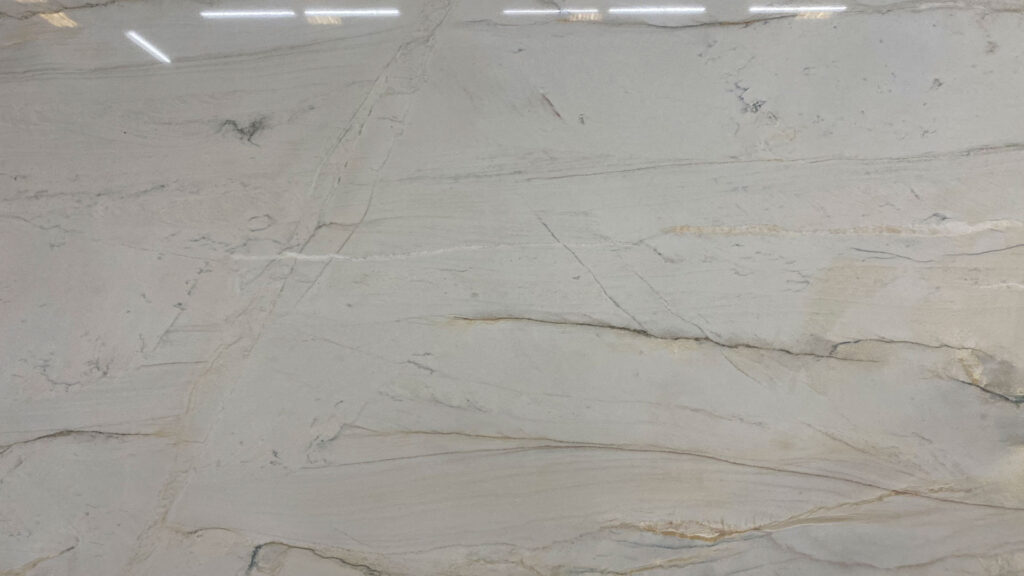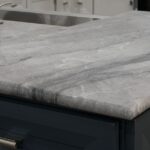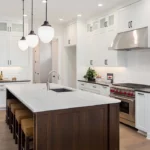Quartz countertops and tiles are getting more popular by the day, with research indicating that they are now the preferred choice for interior designers. On the other hand, there’s still plenty of confusion and misinformation about this engineered stone. In order to end the debate once and for all, we have prepared this complete list of the pros and cons of quartz countertops.
Keep reading to find out all you need to know before you can decide if that beautiful quartz slab is right for your kitchen or not. Before we start, we should better revise a small concept.
For the last time, what is quartz?
This is where all the confusion surrounding quartz comes from. Isn’t quartz a natural resource? So it’s a natural stone, right? NO!
Although quartz is also the name of a natural resource, when we’re talking about the engineered stone used for countertops, that’s a completely different material.
Quartz crystals are very small like sand grains, ultra-hard, and abundant in nature, that’s why it was a great idea when in 1963 a company called Breton invented a way of using it to create a material similar to stone. This material was also named quartz.
Manufactured stone slabs created with Breton Technology, as we know them today, are 87-95 % quartz while the rest is comprised of binding polymeric resins and pigments. This combination provides quartz countertops with some of the best characteristics of natural stones while eliminating some of their downsides.
However, that doesn’t mean the material is perfect, as we will see on this list of the pros and cons of quartz countertops, the manufacturing process also comes with some downsides.

The pros and cons of quartz countertops: A complete rundown
While selecting a new countertop is really exciting, it can be one of the more exhaustive tasks of a kitchen remodeling. Especially if one is not aware of all the necessary information.
While we quickly present facts about quartz you need to consider, keep in mind what are your priorities to ensure you will not be disappointed in the future.
Pro: Amazing durability
Yes, quartz countertops are as durable as they claim to be. If you’re concerned about making a choice you can keep for a lifetime, much like natural stones, you can trust quartz to last longer than you.
It won’t bend, crack or chip easily. Not that it is impossible for it to happen, but under common household circustamces it’s highly unlikely it will ever do. So much that some companies offer a lifetime warranty on all their quartz products.
Con: It’s really heavy
Forget about DIY projects, you’re gonna need to hire professionals in order to install your newest countertop. Remember quartz is highly compressed, so it weighs 20 to 25 pounds per square foot.
Pro: Incredible hardness
On the Mohs scale of mineral hardness, which is rated from 1 to 10, quartz is a solid 7, the same as granite. That means scratching is something to be put out of your concern list.
Again, it’s not impossible for it to scratch, and even though the material is harder than most knives, you should probably use a cutting pad anyway. The point is, keep it properly and scratch marks will never bother you.
Con: It’s harder to repair
If you do manage to scratch it (unlikely), it still can be repaired, but not easily, and not without risks.
While natural stones can be simply repolished and then look new again, due to the resins, quartz is not as simple.
Pro: It is not porous (highly stain resistant)
While natural stones are porous, and thus subjected to liquid penetration, and through it, stains, quartz is virtually impervious, which makes it highly stain resistant.
You don’t need to worry about sealing, and liquid absorption at all.
Con: It still stains, but in a different way
While porosity is the cause of natural stone stains, the same factor that makes quartz impervious makes it vulnerable to staining as well.
Quartz resins and pigments react to certain chemicals causing dulled marks and spots. To be fair, we must also say that simply cleaning spills when they happen will prevent these chemical reactions from happening. Read more about the whole thing in our article “Does quartz stain?”.
Pro: Virtually zero maintenance
While natural stone countertops are very low maintenance (only requiring sealing from time to time), quartz really hits the spot on this one.
Other than common cleaning with neutral soap and water, no maintenance is required. It doesn’t get any better than that, does it?
Con: Heat sensibility
While quartz gives granite and quartzite a good fight on all other factors, heat resistance is unfortunately not one of them. The resins and polymers in quartz can’t take much heat, with some homeowners even claiming that hot dishes from the dishwasher were enough to cause a burn mark.
This is one area you shouldn’t test your quartz countertops, use hot pads to protect it at all times.
Pro: Versatility
While quartz is hyped as a great kitchen countertop material, that’s not the end of it. It’s also perfect for vanities, bar tops, tub decks, and even tiles.
Con: It can’t be exposed to sunlight
That’s right, heat and UV light are quartz kryptonite. Even a couple hours of sunlight exposure can lead quartz colors to change, fading into yellowish tones.
The material is definitely not suitable for outdoor usage.
Pro: Unlimited appearance
Since quartz is a manufactured material, it can be made to look like anything its creator wants. While most fabricators use this feature to create an awesome line of patterns that mimic natural stones. Some others really seek innovation with looks that draw inspiration from very different materials.
Con: It will never be unique
If the manufacturing process brings a nice sensation of control, it also removes any chance of uniqueness.There will always be someone somewhere with a kitchen similar to yours.
On the other hand, natural stones offer each of them a completely natural unprecedent·pattern. There will never be two of a kind.
The Price of Quartz Countertops
Before we conclude our evaluation of the pros and cons of quartz countertops this is one factor we couldn’t forget to mention. While the actual price will vary greatly depending on your contractor, the slab of your choice, and the complexity of your project, it’s possible to estimate a price per square foot of quartz.
According to a 2019 research from HomeAdvisor.com, the average cost of quartz countertops (installation included) is $125 per square foot. A price that is quite similar to their projection on the costs of marble and granite installation as well.
Choosing the best option for your kitchen
As you could probably gather from our list, there’s no one right fit for everyone. Especially since even the price is so similar.
Nevertheless, now that you know all the pros and cons of quartz countertops, we are sure you can make that choice with greater confidence. Start approaching stone suppliers in your city to find out a slab you will fall in love with.
If you’re living in Sarasota or Bradenton, we would love to have you over our showroom. Don’t forget to share this article on social media if you liked it so that other homeowners can be benefitted as well.



